The Faces of Political Arrogance
in the UMNO-Led Government
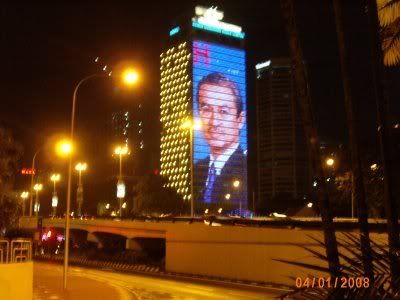
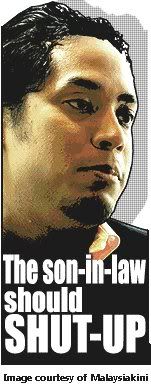
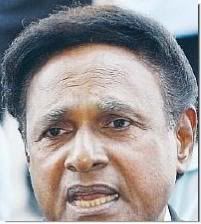

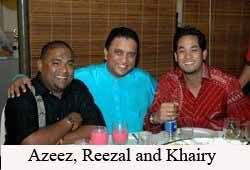







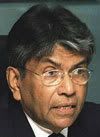






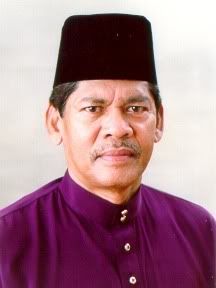
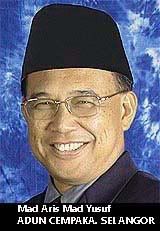
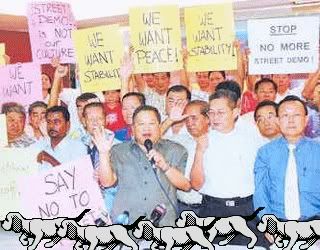

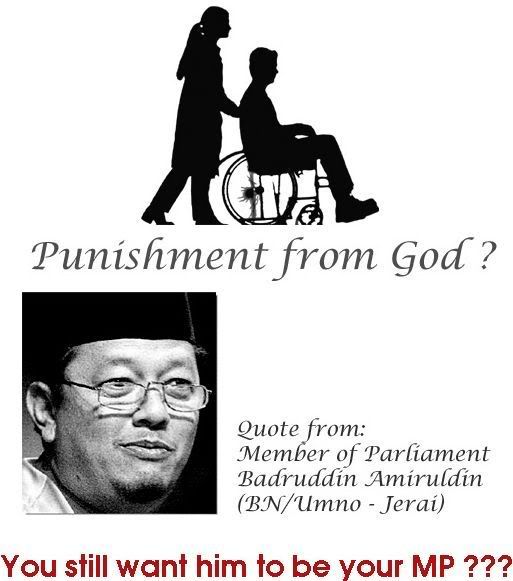
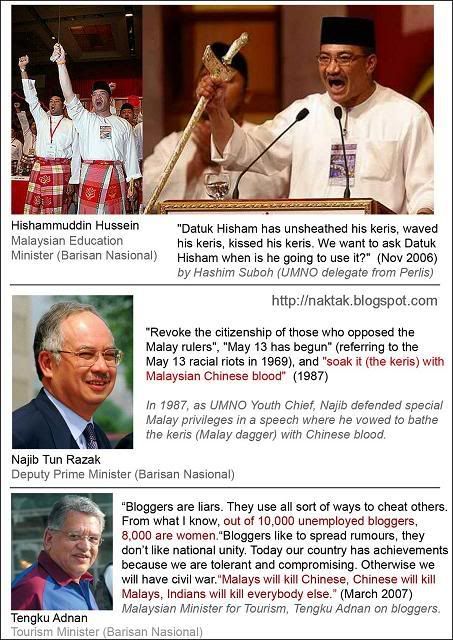
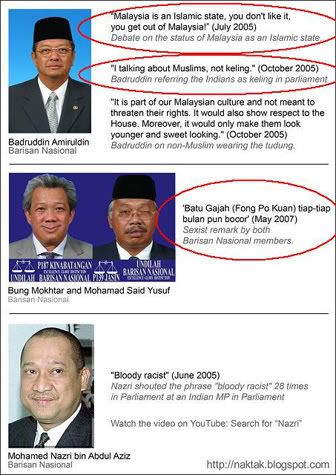
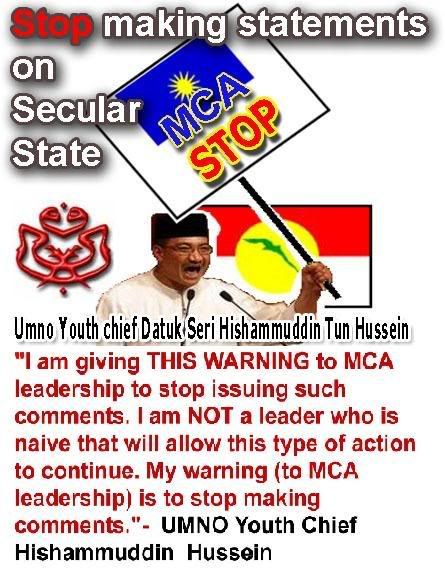
Excerpts: Read here for more
"... Very few expected the Barisan Nasional to be so humbled in this general election just after the country celebrated its 50 years of independence under its rule.
It lost its two-thirds majority in Parliament - a measure of its invincibility, strength and pride. (It) was also ousted in Penang, Kedah, Perak and Selangor.
Few dared suggest it would ever lose its two-thirds majority, the long-time target and objective of all major opposition parties or coalition of parties.
The BN itself never for a moment doubted that it would maintain its hold on two-thirds of the seats in the Dewan Rakyat come what may:
So what happened? Why did the voters deliver such a punishing verdict?Prime Minister Datuk Seri Abdullah Ahmad Badawi had said the BN would maintain its two-thirds majority. Deputy Prime Minister Datuk Seri Najib Razak told RTM that the BN would win more than two-thirds of the Dewan Rakyat seats. Some overconfident officials even said that the BN would repeat its 2004 performance.
The Built-Up Frustrations and Anger
- BN leaders had misread the mood of the people.
After ruling for half a century it believed in its invincibility. (It) refused to acknowledge that the people were angry with some of its policies, decisions and actions. - They thought that the street demonstrations in Terengganu and Kuala Lumpur were nothing more than occasional show of defiance and dissatisfaction over simple bread and butter issues and nothing more beyond that.
- The BN leaders refused to accept the fact that people were now more intelligent than they were fifty years ago. That they were willing to come out and demonstrate, showed that they were really angry and want their grouses be quickly attended to.
- They belittled the demonstrations as something initiated by the opposition parties. This annoyed many people and when BN leaders said that demonstrations are not part of the Malaysian culture, so much so someone wrote that “Umno was born out of demonstrations against the Malayan Union.”
They were also angry at the level of corruption and the seeming unwillingness of the government to root out the problem, but were instead seen as condoning some of the abuses that were becoming widespread.seeming inability to deal with the increase in the levels of crime, refusal to acknowledge the on-going Islamisation, refusal to deal with complaints of neglect of minority races and insistence to continue with the NEP.
Unable to demonstrate to get their grouses heard, they shouted out their protest and anger through the only avenue available to them --- in fact, the only recourse encouraged by the government for them to take instead of demonstrating --- through the ballot box.
It was their anger that did it.
They wanted to show that they matter and not a mere doormat.
The Harnessing of the Multi-Racial Anger
What PKR, DAP and PAS did was merely to harness that anger into votes for them or against the BN and they were quite surprised how easy it was for them to do it.
To his credit, de facto Parti Keadilan Rakyat (PKR) leader,Datuk Seri Anwar Ibrahim, because of his determined effort to cobble together some form of cooperation between his party, DAP and PAS, emerged as an opposition iron, something the BN leaders had not counted on, as to them he was already “irrelevant”.
Anwar's ceramahs became rallies, and thousands flocked to his meet-the-people sessions throughout the country. His rallying call for people to vote opposition regardless of which party and as long as they did not vote BN was effective.
In Kedah, in the state constituency of Bukit Selambau, the voters rejected the MIC candidate and instead voted for the only other non-BN candidate, an independent, also an Indian. The result was a surprise as the MORE THAN HALF of the voters were MALAYS and demonstrated that the anger was multiracial anger.
Thus it is possible that attempts made to discredit Anwar through the media by calling attention to what he did and did not do and what he said while he was deputy prime minister during the last week of campaign backfired.
To the Opposition parties, without proper access to the mainstream media, the rallies helped them get their arguments across to the people. In this the police helped by “closing one eye” to the rules on ceramahs.
Despite (the) unpopularity in withdrawing the use of the indelible ink, the Election Commission is somewhat vindicated when the Opposition was able to make such huge gains.
What Now for BN
For the BN it is time for reflection and reassessment.
It must come to grip with itself and find out how, after winning such a massive mandate in 2004, it squandered the goodwill in less than four years.
It must if it is NOT to become irrelevant.
RELATED ARTICLE
The Perfect Storm He Did Not See Coming
Read here for more on Today Online
by
Abdullah Osman
"... The Malaysian election was a referendum on Mr Abdullah Ahmad Badawi's leadership. And the Prime Minister lost badly.
Not only did Indian and Chinese voters rebuff the leader of the ruling Barisan Nasional (BN) coalition, but the fall of Kedah, Perak and Selangor to the opposition is emphatic proof that Mr Abdullah's love affair with the Malay heartland is over.
Hurt by a combination of bread-and-butter issues and a poor choice of candidates, Mr Abdullah has come to represent everything negative about the ruling coalition — indecisive and tolerant of excesses.
His biggest mistake:
Already, the daggers are out and, true to form, the first to take a stab was his predecessor Mahathir Mohamad.He did not read the signs.
He underestimated the gathering of a perfect storm.
Urging Mr Abdullah to resign, Dr Mahathir said: "He has destroyed Umno, destroyed the BN. He should accept 100 per cent responsibility. I am sorry but I apparently made the wrong choice."
Quite clearly, given the election results, it will be difficult for Mr Abdullah to stay on as president of the United Malays National Organisation (Umno) or as Prime Minister of Malaysia for very much longer.
In all likelihood, there will be a period of consolidation, during which he will appoint the Cabinet, repair the severely-damaged Gerakan and Malaysian Indian Congress (MIC), restore a sense of calm to the ruling coalition and country before handing over the reins to his deputy Najib Tun Razak.
As Malaysians survey the debris from the poll, surprise and fear have come together in a heady mix.
Surprise that the all-conquering BN machinery could not secure its customary two-third majority in Parliament. Surprise that the most industrialised state, Selangor, will be governed by the opposition.
But also, there is a fear. Will there be a period of heightened tension, perhaps even riots? Will foreign investors shy away? Will the country's politics become so divisive that nothing will get done?
The answers: No. No. No.
If there is one clear winner, it is Malaysia.
For too long, the country has been going down the road of ethnic polarisation, corruption, racial dominance and religious intolerance. That is why the Chinese and Indians have felt like second-class citizens, and resented the likes of Mr Hishamuddin Hussein and Mr Khairy Jamaluddin, whose kris-wielding acts at the Umno assembly were used to the hilt by the opposition.
For the middle-class, the likes of Umno stalwart Zakaria Deros, who managed to build a palatial home without any approvals, have come to represent the unacceptable face of Malaysian politics.
Perhaps now, with a strong opposition that seems committed to a multi-racial and multi-religious Malaysia, there will be less of a tendency to only see policies through the lenses of one race.
Perhaps, now Malaysian politics will be re-calibrated back on the road to moderation. This election will change Malaysia forever, and as it is dissected and critiqued, here are several early predictions:
- A two-party system may be emerging
It is early days yet but Malaysia could be witnessing the start of a two-party system. When Malaysians voted for Democratic Action Party (DAP), or Parti Islam SeMalaysia (PAS), or Parti Keadilan Rakyat (PKR) candidates, they believed that they were voting for an alternative to BN.
Whether this two-party system comes to fruition will depend on DAP-PAS-PKR running their states well and not fighting over the spoils of victory. Still, the Malaysian voter has never had it better. - Voting may no longer follow racial lines
For a long time, the Indian and Chinese voter has not supported PAS, fearing its Islamic agenda. Not anymore. Chinese and Indians voted for PAS candidates across the country, including in urban seats.
For Indians, the rationale was simple: their years of supporting Umno, MIC or MCA candidates had not yielded major benefits for the community, so they were willing to give any opposition the chance.
Meamwhile, the Chinese believe that Umno has become more fundamentalist than PAS in some respects. From a marketing point of view, there is little to separate Umno from PAS these days.
Similarly some had feared that this election might have a polarising effect, with Indians and Chinese on one side, and the Malays supporting the ruling coalition on the other. This has not happened.
Instead, voters from across all races supported change.
This was the perfect storm when issues that have been percolating for two years came to a head.
For the Indians, it was the demolition of temples, marginalisation, cases of Hindus converting to Islam, and the manner in which Hindraf leaders were treated by the government.
For the Chinese, it was crime, an erosion of language and cultural rights, nationalism and fear of the revival of the Malay agenda.
For the Malays, inflation, crime and the excesses of Umno politicians unsettled them.
These groups were, in fact, united in their belief that Mr Abdullah had fallen far short of the targets he had promised. Yes, the economy grew by 6.3 per cent, but the gains were not felt on the ground. - Voters expect to be heard
When Mr Abdullah announced his line-up, there was an air of resignation even among his supporters. They had been pushing him to drop many old faces and discredited names and to create an aura of renewal around the BN. He dithered, reluctant to unsettle the ground. Many ended up crushed.
Similarly, he was urged to drop MIC chief Samy Vellu but felt he could not desert a friend in this time of need. Mr Vellu was also defeated.
Mr Abdullah clearly misread the ground.
Malaysians wanted change, and when he could not offer them that, the voters took matters into their own hands. - Anwar Ibrahim is back
Say what you like, but Mr Anwar Ibrahim is back in the fray, this time as a real player.
Despite efforts by the media to demonise him, his stinging attacks on the government for corruption, his championing of issues close to the hearts of non-Malays and his charisma have made him a key figure in the election.
His party, Keadilan, won 29 seats in Parliament, indicating that an electorate looking for a strong leader has forgiven his shortcomings.
For the country, the next few months will be challenging. How the BN negotiates its reduced majority in Parliament and deals with a resurgent opposition will hold the key to the nation's political stability.
In the longer term, its ability to respond to the aspirations of all Malaysians and make the necessary changes will determine just what Election 2008 really means:-- An aberration,
-- A defining moment for a less race-based approach to politics, or
-- A sign of worse things to come.
No comments:
Post a Comment